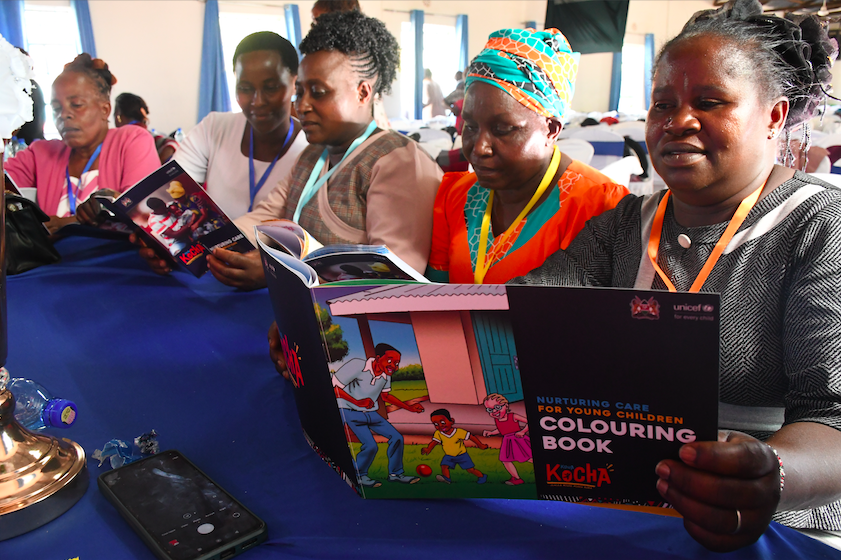 In addition to the core components of ECD,
teachers were introduced to the “Kuwa Kocha” campaign, meaning “Be a
Coach” in Kiswahili.
In addition to the core components of ECD,
teachers were introduced to the “Kuwa Kocha” campaign, meaning “Be a
Coach” in Kiswahili.
On April 7 and 8, 2025, Unicef, in collaboration with the Makueni County Government, supported the training of 1,000 Early Childhood Development (ECD) teachers, marking a pivotal moment in the county’s commitment to its youngest citizens. This initiative, led by County Deputy Governor, Lucy Mulili and facilitated by Unicef Kenya’s chief of nutrition, Ismael Teta, was more than a training session, it marked a significant step in promoting ECD in the region.
ECD refers to the physical, cognitive, emotional, language, and social growth of children from birth to age 8, with a particular emphasis on the first 1,000 days from conception. These early years are a critical window for brain development and physical growth, shaping a child’s future in profound ways. It is not merely a developmental phase but a fundamental right of every child.
Why is ECD so critical? The experiences children have in their earliest years lay the foundation for lifelong learning, behaviour, and health. Good nutrition, responsive caregiving, safety, early learning opportunities, and health during this period can dramatically improve outcomes, reducing inter-generational poverty and inequality. In essence, investing in ECD is investing in a child’s potential and in the future prosperity of entire communities and nations.
“ECD is at the centre of our mission, putting children first and ensuring their rights are fully realized,” said Jayne Kariuki-Njuguna, Unicef ‘sSocial Behaviour Change Specialist. “Investing in ECD gives every child the best chance to reach their full potential. By prioritising ECD, we can break cycles of poverty and inequality, giving every child a fair start.”
This is why Makueni County is seen to be setting a powerful example in Kenya’s ECD landscape with this recent training of 1,000 ECD teachers. The training focused on the critical role of the early years, emphasizing the five key components of nurturing care for ECD.
Elizabeth Muli, the Makueni County Chief Executive Committee Member for ICT, Education, and Internship, emphasised the key elements, noting, “To ensure that every child in Makueni can thrive, they must have good health, adequate nutrition, responsive caregiving, opportunities for early learning, and enjoy security and safety in their homes and communities. By imparting these principles during the training, we enable teachers and equip them to support holistic child development, not just in classrooms but across their communities.”
In addition to the core components of ECD, teachers
were introduced to the “Kuwa Kocha” campaign, meaning “Be a Coach” in
Kiswahili. Inspired by the African proverb “It takes a village to raise a
child,” this multimedia Social and Behaviour Change campaign was co-created by the
UN agency in collaboration with the Ministries of Health, Education, and Labour
& Social Protection to support the Nurturing Care Framework for ECD. The
campaign provides engaging materials, including posters, colouring books, and
guides, to promote quality ECD services. Teachers were trained on these
communication tools to enhance their ability to advocate for children’s rights
and foster community-wide support for ECD.
While Makueni’s efforts are inspiring, they
highlight a sobering reality: Kenya’s investment in ECD significantly lags
behind regional standards. The country allocates just $81 per child annually to
ECD, compared to an average of $138 across the Eastern and Southern Africa
Region. Public financing for ECD is alarmingly low, representing less than one
per cent of total government spending. This funding gap limits the ability to
provide comprehensive ECD services to all children, particularly in underserved
areas.
However, there is hope on the horizon. Kenya is moving towards enacting an Integrated ECD Policy, currently under review by the Kenyan Cabinet. This policy aims to provide a cohesive framework for ECD services nationwide.
Unicef is advocating for the adoption of an integrated national ECD policy, which includes the design and rollout of the “Kuwa Kocha” campaign in partnership with the Ministries of Health, Education, and Labour & Social Protection. UNICEF also chairs amulti-sectoral task forcewho coordinates ECD activities across various sectors, aiming to maximize reach and effectiveness.
Training
of ECD teachers is a cornerstone of the Government and UNICEF’s ECD strategy,
guided by six principles: rights-based, equity-focused, gender-responsive,
context-specific, evidence-informed, and systems-centered. By equipping
teachers with skills in responsive caregiving, early stimulation, and positive
parenting, the training programme aims to create a skilled, scalable workforce
capable of delivering quality ECD services for children.
In
Makueni County, the training’s impact is expected to directly benefit nearly 43,000
children aged 3 to 6 years by improving early childhood services, enhancing
school readiness, and boosting learning outcomes. These trrained teachers are
envisioned to be change agents, reinforcing positive parenting practices and
healthy behaviors at the household and community levels.
This
includes increased parental engagement, promote early detection of
developmental delays or disabilities, encourage positive parenting, thereby reducing
harmful practices, such as violent discipline, to create safer learning
environments.
The training of ECD teachers in Makueni County is more than a single event—it’s a call to action for all other counties and indeed all stakeholders to keep the momentum going, for increased and sustained investment in early childhood development. By nurturing the youngest generation, Kenya is sowing the seeds for a prosperous and inclusive tomorrow.












